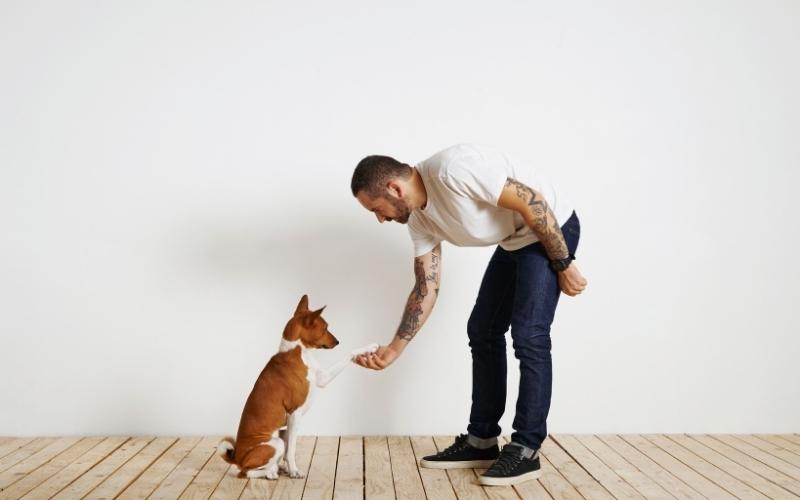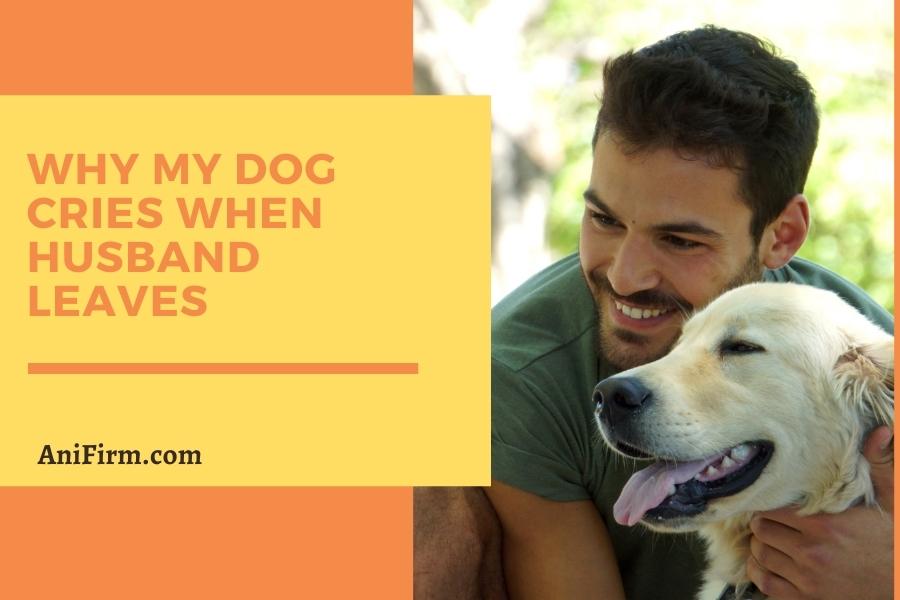Every living being, whether a canine or a human, has feelings. As living beings, we form ties with people, which causes us to feel uneasy when they depart, much as dogs do. You may have found yourself in a position where your husband has left the house, the dog has begun crying, and you’re trying to figure out why?
Remember that the dog considers his owner his entire universe, and when he notices that his friend is leaving or leaving the area, he grieves. In general, one might state they are experiencing a sense of disconnection at the time and cannot cope with it.
Separation anxiety is a term used to describe this scenario, particularly prevalent in pets. However, domestication does not imply that a dog’s instincts or characteristics have vanished. Instead, it thinks of its family as a pack, with its owner as of the pack leader.
There’s a fine line between your dog objecting to your departure and suffering from separation anxiety. It’s challenging but crucial to learn how to console our dogs in such a situation.
Why does my dog cry or whine when my husband leaves?
If your dog begins to cry when your husband leaves; remember that he is experiencing mixed emotions. Consider how you would feel if your loved one went somewhere and you wouldn’t be able to see them for the next few hours from a dog’s perspective. The sensation you’re experiencing right now is the same sensation dogs are experiencing.
Dogs rely on their owners for food, water, and walks, and they can get connected to them and feel unhappy when they are not with them. In addition, the dogs believe they will never see them again when the owner leaves, causing separation anxiety.
This trait is very common among dogs, and there is no need to be concerned. However, you should be aware that you are not encouraging such behavior. For example, if you reward such acts as patting him on the head when he sobs after leaving, you give them negative reinforcement. Instead, attempt to ignore them, and they’ll learn to calm down.
What Is Separation Anxiety?

Separation anxiety is a condition that can be very upsetting for both owners and their dogs, and it can cause owners to decide to give up their dogs.
These dogs might bring their behavior problems to the next home if nothing is done. Even though research results don’t always agree, some things may make dogs more likely to act up when they are alone.
Owners may be able to stop their dogs from getting separation anxiety. Still, suppose their dog does get separation anxiety. In that case, the problem may be reduced or gone. With a behavior
modification program run by the owner and a little medication in the beginning.
Train Your Dog to Not Cry when Your Husband Leaves

As we all know, every problem comes with a solution, and likewise, there are options available for this too. But understand your husband needs to join hands with you to solve this. When you both are together, the steps you can take to deal with the same behavior include: –
1. Do not encourage such behavior
Firstly, it is important to know that encouraging such behavior in a dog will make him habitual, and he will repeatedly whines when you leave the place. Thus, it is important when you are leaving, and he starts crying, you are not showing any love or empathy to him at that time and ignoring him. Do not pat his back because this makes him crave your attention more. Be normal while leaving the place, and let your dog notice the entire episode too.
2. Get a puzzle feeder for your dog
The market offers a variety of toys specially designed for dogs, and thankfully the puzzle feeder is one of them. You can simply get the puzzle feeder available and equip your dog with it when you are about to leave. This helps him to get involved in it, and he will not have your glimpse when you are about to leave. Furthermore, in return, it will not let your dog cry and feel guilty that you are going.
3. Give your dog sufficient attention
Sometimes it happens that due to 9 to 5 jobs, you are not in the state to give sufficient time to your dog. In that case, they start feeling separated and will not be able to cope with the ongoing feeling; they get anxious for a while and crave your attention.
In such a situation, it is advisable to spend sufficient time with your dog. After the office, go out with him and explore the nearby surroundings. This will not let him feel separated at all, and when you leave the place next time, he will not cry or whine.
4. Turn on the Radio or TV
Radio or TV are the biggest distractions in the house, and undoubtedly, when you turn them ON, these act as one. Well, for your dog, too, this is a great distraction, and they will not have a thought to look at other things happening in the surroundings. So, instead, you can simply play any melodious song over it and enjoy it with the dog. Do you know dogs also like to dance? Although they are unaware of the movements, they enjoy the beat.
5. Try to spend more time with your dog in your husband’s absence
It is equally important for both you and your husband to take care of the canine available at the place. If you are not paying attention to the canine, he will eventually start crying when his best companion leaves the place. Well, it is advisable that do spend some more time with the dog in the absence of your husband. You can engage in some exercise sessions with him, feed him food, explore new places, and do other stuff.
6. Dog training is important
Last but not least, dog training is the only option left to you. During the training sessions, the dogs get trained for such situations, and they learn about such behavior too. When your dog learns this habit, he will not cry or whine again when you leave the place. But do know that one needs to be consistent with the dog training sessions.
Note: Do know every dog portrays a different behavior. Sometimes it happens that your dog starts crying whenever you leave the place, and sometimes this thing doesn’t create any difference for him. No matter what the condition is, it is not advisable to encourage such behavior because it makes him habitual and later turns out to be a problem for you.
Also read: Why won’t my dog leave my side?
Some Proven Methods to Train Dogs
Well, some dog experts, after long research, have come up with the best methods to train dogs not to cry when you leave. These methods include:
1. The Desensitize Method
Majorly people adopt the desensitized method. In this method, you are keeping things normal and not fussing about things.
You are supposed to do things in the same order as you used to, but in the entire episode, do not pay attention to your dog at the time when you leave as well. This makes him wait for you, which makes him cry.
Do not give the reunion statements too when leaving the place, and keep things sorted.
2. The Set the Scene Method
The set scene method indicates the preparations you need to do for the dog. In this method, you need to assess the environment as per your dog’s choice. Set his bed in the quiet area of your house and consider the pheromone therapy around his bed. This helps your dog feel relaxed. Make sure no light is there in the surroundings that can disturb the entire scene, and for that, draw the curtains. Let your dog be in the same place for a while, and also put some tasty treats so he will get busy with them.
3. The Keep the Busy Method
The busy method is one of the best methods and my favorite too. LOL! Well, for this method, you will not need to make any additional arrangements. You need to spend time with your dog before leaving the place. You can consider some exercise sessions and feed him his favorite food too. Let them be in the moment for a while and leave the “I will return message” for them. When they are tired, they will not like to do unnecessary things. Instead, they consider sleeping peacefully.
Also, when they wake up for that duration, they leave a distraction in the place so that they will get busy with it and miss you less.
The Treatment of Canine Separation-Related Behavior Problems
| Treatment | Reasons for Use | Reasons Against Use |
|---|---|---|
| Medication: General | Can help to reduce problem behavior May increase the efficacy of behavioral interventions | Expensive Medication alone is not sufficient to eliminate the problem Medication in the absence of a behavioral intervention maintains reliance on medication Side effects |
| Medication: Clomipramine | Improvement in separation-related behavior Increases passive behavior Decreases anxious behavior including pacing, scratching, whining, and barking | Side effects: canine pancreatitis; abdominal pain; vomiting; lethargy |
| Medication: Fluoxetine | Improvements in separation-related behavior | Side effects: lethargy, depression, loss of appetite Dogs may refuse chewable fluoxetine tablets |
| Dog-Appeasing Pheromone | May reduce problem behavior | Little research to support the use Long-term efficacy unknown |
| Systematic Desensitization | Reduces or eliminates problem behavior Inexpensive Does not require medicating the dog | Time-consuming for a dog owner Need to avoid long absences at the beginning of the intervention |
| Counter Conditioning | May improve the efficacy of systematic desensitization | Probably ineffective in isolation |
Before Administering Any Medication to Your Pets, You Should Get the Advice of A Qualified Pet Professional such as A Veterinarian.
AniFirm
Last but Not Least
Dogs love your husband, and if they could, they would spend every minute of the day with him. When your husband leaves, your dog feels a lot of worry, sadness, and uncertainty. Dogs show this through their cries, hoping that their owner will come back sooner. No one likes being lonely, so it’s important to teach your dog how to deal with it in a healthy way.
If your home-based training isn’t working, take the dog to a dog training center and let him learn the things there. Then, things will turn out well for him, and he won’t have any more problems.
